Business Communication Report: Enhancing Workplace Communication
VerifiedAdded on 2023/01/19
|9
|2187
|60
Report
AI Summary
This report provides a comprehensive analysis of business communication, focusing on its purposes, principles, and practical applications within an organizational context. The report begins with an abstract that highlights the importance of effective communication in today's business environment, emphasizing its role in fostering interaction and collaboration among stakeholders. The introduction sets the stage by discussing the essence of communication in management and its significance in achieving business objectives. The report then delves into the core of the assignment by describing and analyzing the purposes and principles behind different forms of organizational communication. It also discusses the application of effective communication principles to enhance practices, and evaluates the communication practices of the author and others. Specific attention is given to the case of Mr. Fishy, a restaurant, to illustrate how new policies and communication strategies can be implemented to improve cooperation and respect among colleagues. The report highlights the importance of formal and informal communication channels, and the need for employees to actively listen and adjust their communication medium. The conclusion summarizes the key findings, reiterating the critical role of effective communication in achieving business goals and maintaining consistency within an organization. The report concludes with a list of references that support the analysis and findings.
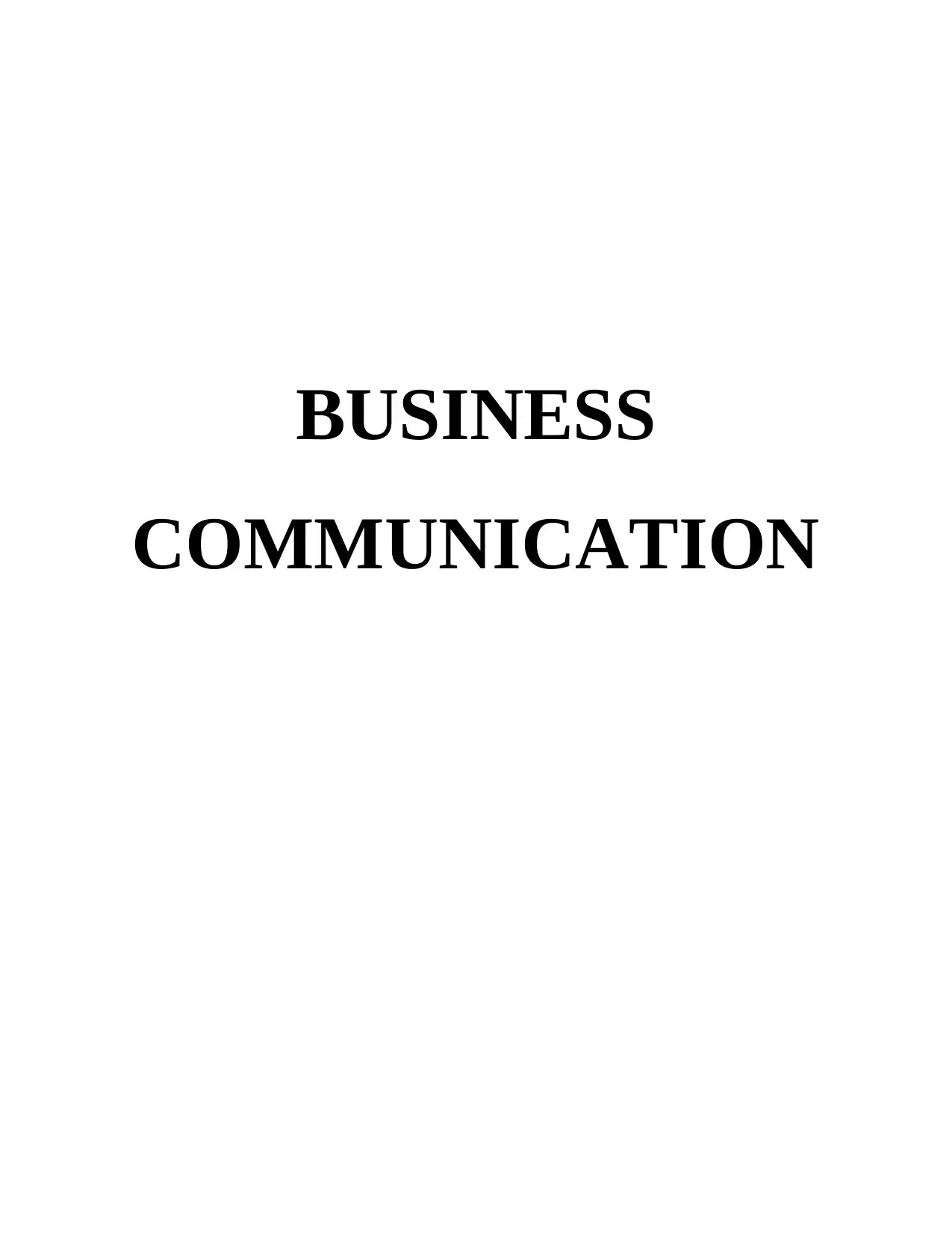
BUSINESS
COMMUNICATION
COMMUNICATION
Paraphrase This Document
Need a fresh take? Get an instant paraphrase of this document with our AI Paraphraser
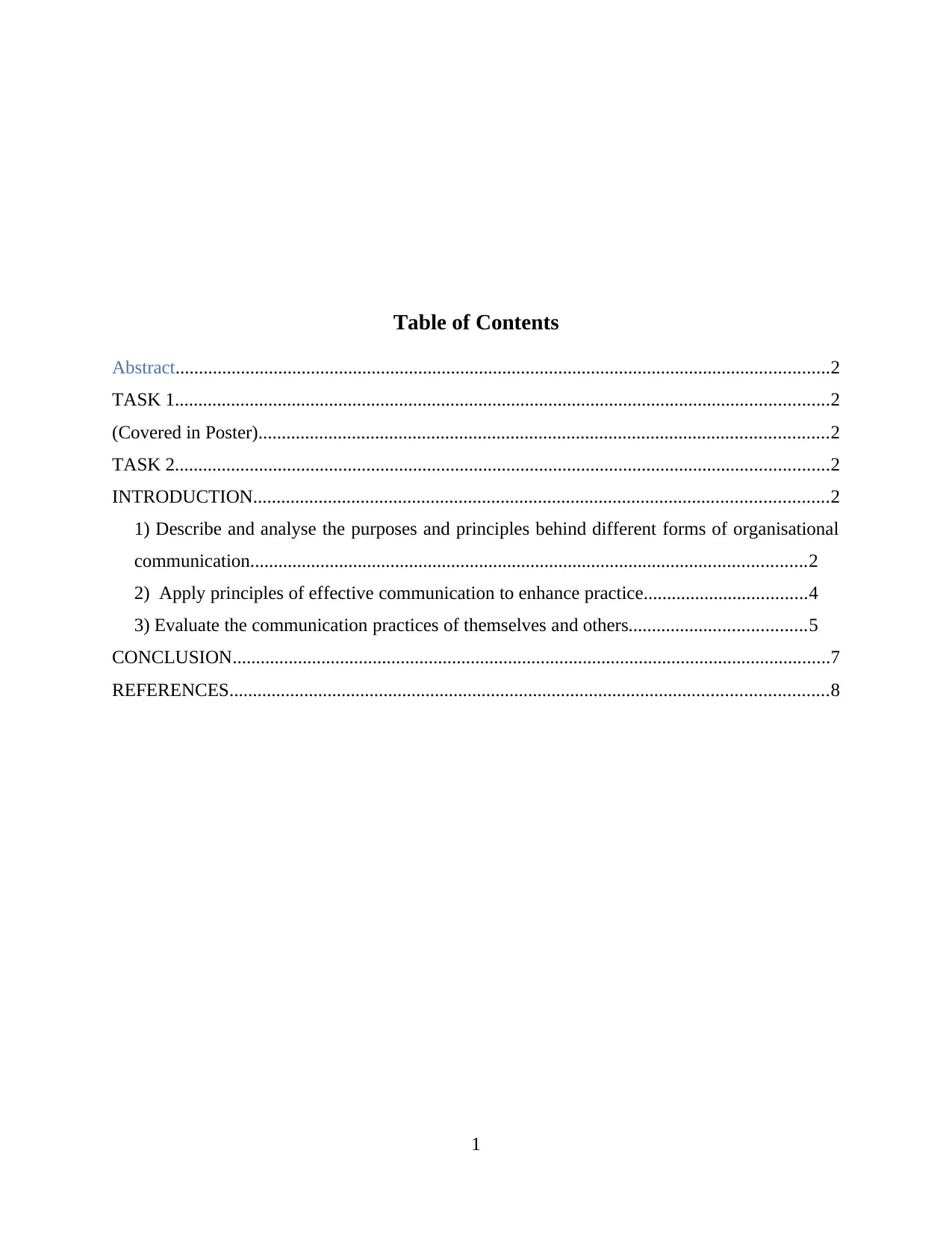
Table of Contents
Abstract............................................................................................................................................2
TASK 1............................................................................................................................................2
(Covered in Poster)..........................................................................................................................2
TASK 2............................................................................................................................................2
INTRODUCTION...........................................................................................................................2
1) Describe and analyse the purposes and principles behind different forms of organisational
communication.......................................................................................................................2
2) Apply principles of effective communication to enhance practice...................................4
3) Evaluate the communication practices of themselves and others......................................5
CONCLUSION................................................................................................................................7
REFERENCES................................................................................................................................8
1
Abstract............................................................................................................................................2
TASK 1............................................................................................................................................2
(Covered in Poster)..........................................................................................................................2
TASK 2............................................................................................................................................2
INTRODUCTION...........................................................................................................................2
1) Describe and analyse the purposes and principles behind different forms of organisational
communication.......................................................................................................................2
2) Apply principles of effective communication to enhance practice...................................4
3) Evaluate the communication practices of themselves and others......................................5
CONCLUSION................................................................................................................................7
REFERENCES................................................................................................................................8
1
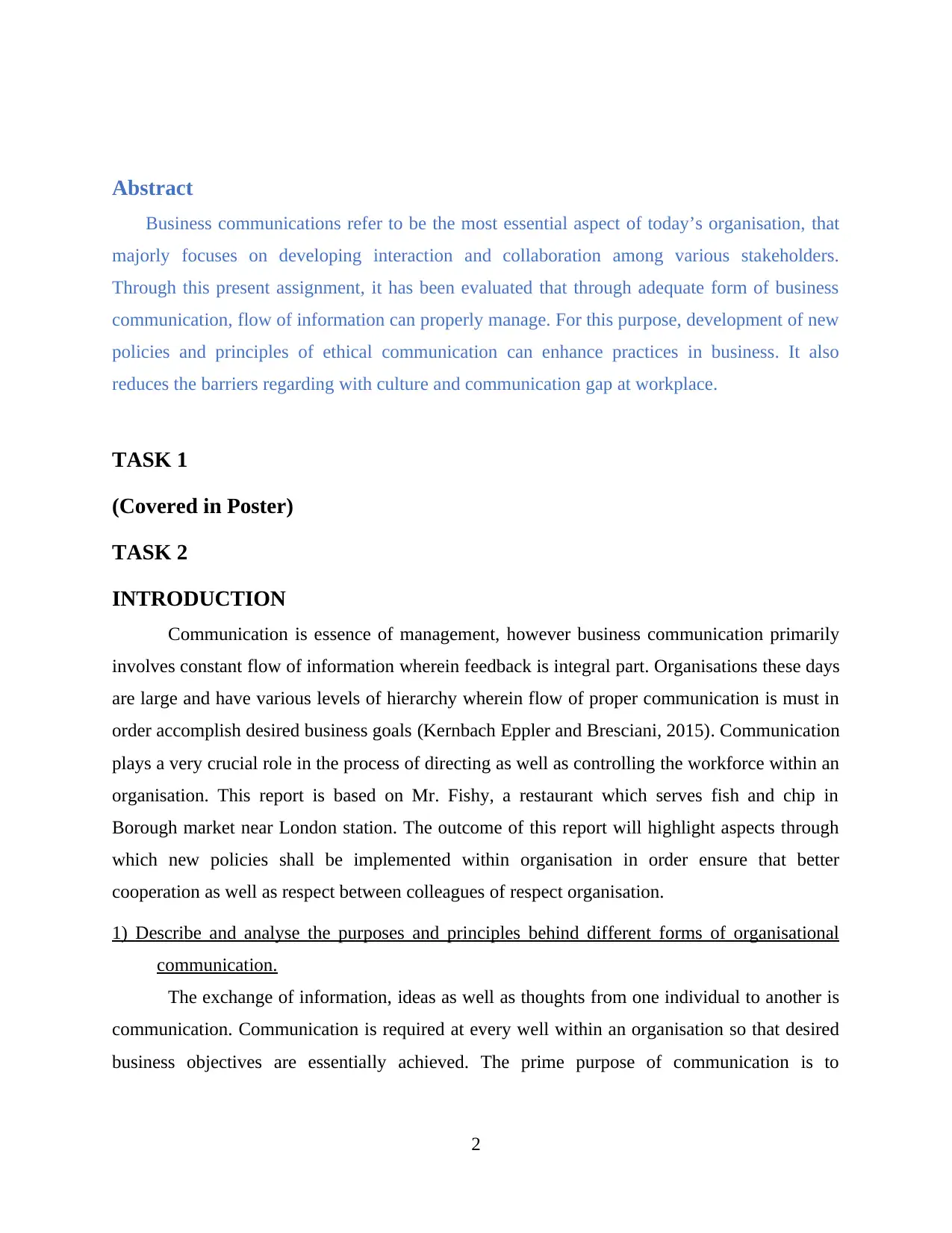
Abstract
Business communications refer to be the most essential aspect of today’s organisation, that
majorly focuses on developing interaction and collaboration among various stakeholders.
Through this present assignment, it has been evaluated that through adequate form of business
communication, flow of information can properly manage. For this purpose, development of new
policies and principles of ethical communication can enhance practices in business. It also
reduces the barriers regarding with culture and communication gap at workplace.
TASK 1
(Covered in Poster)
TASK 2
INTRODUCTION
Communication is essence of management, however business communication primarily
involves constant flow of information wherein feedback is integral part. Organisations these days
are large and have various levels of hierarchy wherein flow of proper communication is must in
order accomplish desired business goals (Kernbach Eppler and Bresciani, 2015). Communication
plays a very crucial role in the process of directing as well as controlling the workforce within an
organisation. This report is based on Mr. Fishy, a restaurant which serves fish and chip in
Borough market near London station. The outcome of this report will highlight aspects through
which new policies shall be implemented within organisation in order ensure that better
cooperation as well as respect between colleagues of respect organisation.
1) Describe and analyse the purposes and principles behind different forms of organisational
communication.
The exchange of information, ideas as well as thoughts from one individual to another is
communication. Communication is required at every well within an organisation so that desired
business objectives are essentially achieved. The prime purpose of communication is to
2
Business communications refer to be the most essential aspect of today’s organisation, that
majorly focuses on developing interaction and collaboration among various stakeholders.
Through this present assignment, it has been evaluated that through adequate form of business
communication, flow of information can properly manage. For this purpose, development of new
policies and principles of ethical communication can enhance practices in business. It also
reduces the barriers regarding with culture and communication gap at workplace.
TASK 1
(Covered in Poster)
TASK 2
INTRODUCTION
Communication is essence of management, however business communication primarily
involves constant flow of information wherein feedback is integral part. Organisations these days
are large and have various levels of hierarchy wherein flow of proper communication is must in
order accomplish desired business goals (Kernbach Eppler and Bresciani, 2015). Communication
plays a very crucial role in the process of directing as well as controlling the workforce within an
organisation. This report is based on Mr. Fishy, a restaurant which serves fish and chip in
Borough market near London station. The outcome of this report will highlight aspects through
which new policies shall be implemented within organisation in order ensure that better
cooperation as well as respect between colleagues of respect organisation.
1) Describe and analyse the purposes and principles behind different forms of organisational
communication.
The exchange of information, ideas as well as thoughts from one individual to another is
communication. Communication is required at every well within an organisation so that desired
business objectives are essentially achieved. The prime purpose of communication is to
2
⊘ This is a preview!⊘
Do you want full access?
Subscribe today to unlock all pages.

Trusted by 1+ million students worldwide
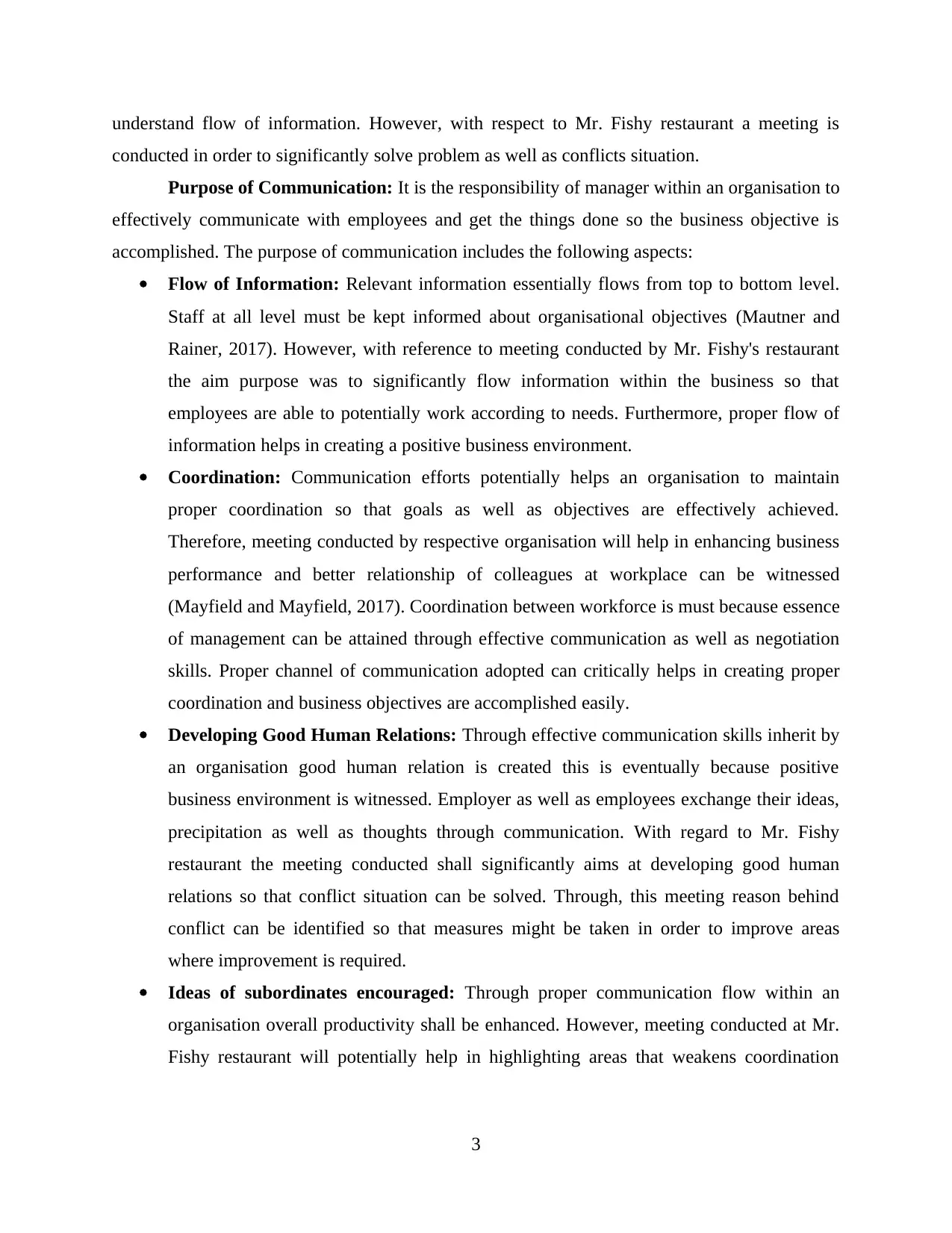
understand flow of information. However, with respect to Mr. Fishy restaurant a meeting is
conducted in order to significantly solve problem as well as conflicts situation.
Purpose of Communication: It is the responsibility of manager within an organisation to
effectively communicate with employees and get the things done so the business objective is
accomplished. The purpose of communication includes the following aspects:
Flow of Information: Relevant information essentially flows from top to bottom level.
Staff at all level must be kept informed about organisational objectives (Mautner and
Rainer, 2017). However, with reference to meeting conducted by Mr. Fishy's restaurant
the aim purpose was to significantly flow information within the business so that
employees are able to potentially work according to needs. Furthermore, proper flow of
information helps in creating a positive business environment.
Coordination: Communication efforts potentially helps an organisation to maintain
proper coordination so that goals as well as objectives are effectively achieved.
Therefore, meeting conducted by respective organisation will help in enhancing business
performance and better relationship of colleagues at workplace can be witnessed
(Mayfield and Mayfield, 2017). Coordination between workforce is must because essence
of management can be attained through effective communication as well as negotiation
skills. Proper channel of communication adopted can critically helps in creating proper
coordination and business objectives are accomplished easily.
Developing Good Human Relations: Through effective communication skills inherit by
an organisation good human relation is created this is eventually because positive
business environment is witnessed. Employer as well as employees exchange their ideas,
precipitation as well as thoughts through communication. With regard to Mr. Fishy
restaurant the meeting conducted shall significantly aims at developing good human
relations so that conflict situation can be solved. Through, this meeting reason behind
conflict can be identified so that measures might be taken in order to improve areas
where improvement is required.
Ideas of subordinates encouraged: Through proper communication flow within an
organisation overall productivity shall be enhanced. However, meeting conducted at Mr.
Fishy restaurant will potentially help in highlighting areas that weakens coordination
3
conducted in order to significantly solve problem as well as conflicts situation.
Purpose of Communication: It is the responsibility of manager within an organisation to
effectively communicate with employees and get the things done so the business objective is
accomplished. The purpose of communication includes the following aspects:
Flow of Information: Relevant information essentially flows from top to bottom level.
Staff at all level must be kept informed about organisational objectives (Mautner and
Rainer, 2017). However, with reference to meeting conducted by Mr. Fishy's restaurant
the aim purpose was to significantly flow information within the business so that
employees are able to potentially work according to needs. Furthermore, proper flow of
information helps in creating a positive business environment.
Coordination: Communication efforts potentially helps an organisation to maintain
proper coordination so that goals as well as objectives are effectively achieved.
Therefore, meeting conducted by respective organisation will help in enhancing business
performance and better relationship of colleagues at workplace can be witnessed
(Mayfield and Mayfield, 2017). Coordination between workforce is must because essence
of management can be attained through effective communication as well as negotiation
skills. Proper channel of communication adopted can critically helps in creating proper
coordination and business objectives are accomplished easily.
Developing Good Human Relations: Through effective communication skills inherit by
an organisation good human relation is created this is eventually because positive
business environment is witnessed. Employer as well as employees exchange their ideas,
precipitation as well as thoughts through communication. With regard to Mr. Fishy
restaurant the meeting conducted shall significantly aims at developing good human
relations so that conflict situation can be solved. Through, this meeting reason behind
conflict can be identified so that measures might be taken in order to improve areas
where improvement is required.
Ideas of subordinates encouraged: Through proper communication flow within an
organisation overall productivity shall be enhanced. However, meeting conducted at Mr.
Fishy restaurant will potentially help in highlighting areas that weakens coordination
3
Paraphrase This Document
Need a fresh take? Get an instant paraphrase of this document with our AI Paraphraser
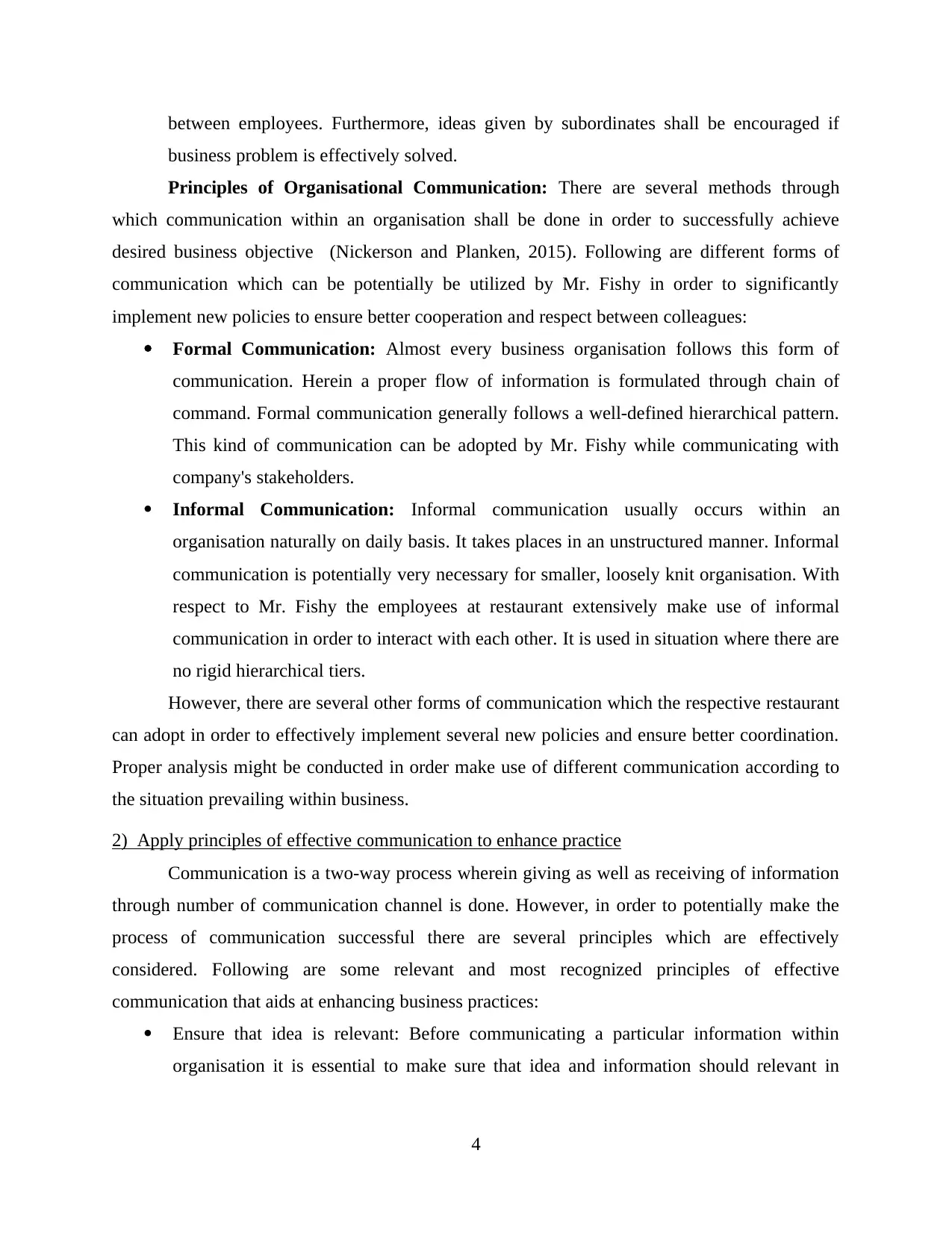
between employees. Furthermore, ideas given by subordinates shall be encouraged if
business problem is effectively solved.
Principles of Organisational Communication: There are several methods through
which communication within an organisation shall be done in order to successfully achieve
desired business objective (Nickerson and Planken, 2015). Following are different forms of
communication which can be potentially be utilized by Mr. Fishy in order to significantly
implement new policies to ensure better cooperation and respect between colleagues:
Formal Communication: Almost every business organisation follows this form of
communication. Herein a proper flow of information is formulated through chain of
command. Formal communication generally follows a well-defined hierarchical pattern.
This kind of communication can be adopted by Mr. Fishy while communicating with
company's stakeholders.
Informal Communication: Informal communication usually occurs within an
organisation naturally on daily basis. It takes places in an unstructured manner. Informal
communication is potentially very necessary for smaller, loosely knit organisation. With
respect to Mr. Fishy the employees at restaurant extensively make use of informal
communication in order to interact with each other. It is used in situation where there are
no rigid hierarchical tiers.
However, there are several other forms of communication which the respective restaurant
can adopt in order to effectively implement several new policies and ensure better coordination.
Proper analysis might be conducted in order make use of different communication according to
the situation prevailing within business.
2) Apply principles of effective communication to enhance practice
Communication is a two-way process wherein giving as well as receiving of information
through number of communication channel is done. However, in order to potentially make the
process of communication successful there are several principles which are effectively
considered. Following are some relevant and most recognized principles of effective
communication that aids at enhancing business practices:
Ensure that idea is relevant: Before communicating a particular information within
organisation it is essential to make sure that idea and information should relevant in
4
business problem is effectively solved.
Principles of Organisational Communication: There are several methods through
which communication within an organisation shall be done in order to successfully achieve
desired business objective (Nickerson and Planken, 2015). Following are different forms of
communication which can be potentially be utilized by Mr. Fishy in order to significantly
implement new policies to ensure better cooperation and respect between colleagues:
Formal Communication: Almost every business organisation follows this form of
communication. Herein a proper flow of information is formulated through chain of
command. Formal communication generally follows a well-defined hierarchical pattern.
This kind of communication can be adopted by Mr. Fishy while communicating with
company's stakeholders.
Informal Communication: Informal communication usually occurs within an
organisation naturally on daily basis. It takes places in an unstructured manner. Informal
communication is potentially very necessary for smaller, loosely knit organisation. With
respect to Mr. Fishy the employees at restaurant extensively make use of informal
communication in order to interact with each other. It is used in situation where there are
no rigid hierarchical tiers.
However, there are several other forms of communication which the respective restaurant
can adopt in order to effectively implement several new policies and ensure better coordination.
Proper analysis might be conducted in order make use of different communication according to
the situation prevailing within business.
2) Apply principles of effective communication to enhance practice
Communication is a two-way process wherein giving as well as receiving of information
through number of communication channel is done. However, in order to potentially make the
process of communication successful there are several principles which are effectively
considered. Following are some relevant and most recognized principles of effective
communication that aids at enhancing business practices:
Ensure that idea is relevant: Before communicating a particular information within
organisation it is essential to make sure that idea and information should relevant in
4
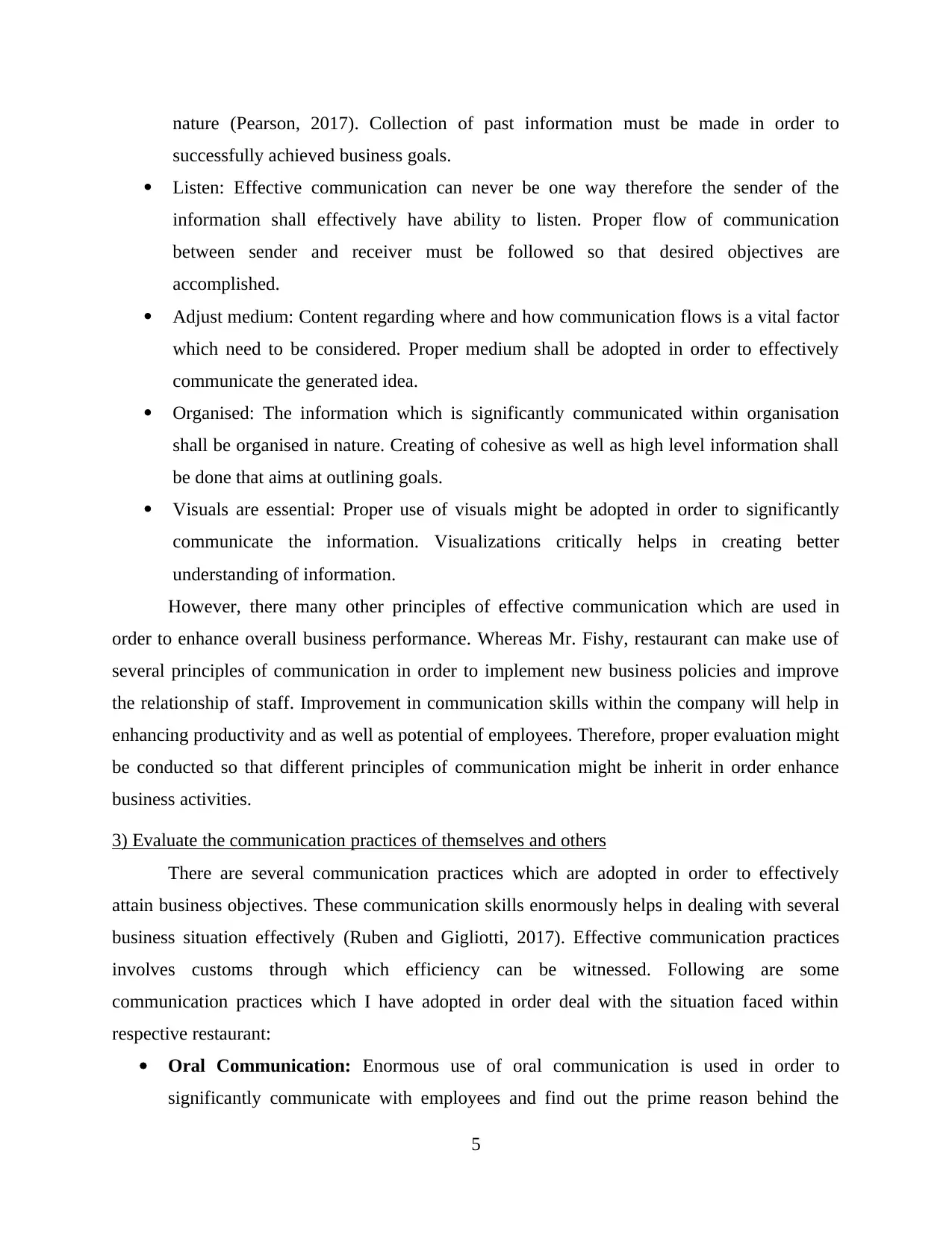
nature (Pearson, 2017). Collection of past information must be made in order to
successfully achieved business goals.
Listen: Effective communication can never be one way therefore the sender of the
information shall effectively have ability to listen. Proper flow of communication
between sender and receiver must be followed so that desired objectives are
accomplished.
Adjust medium: Content regarding where and how communication flows is a vital factor
which need to be considered. Proper medium shall be adopted in order to effectively
communicate the generated idea.
Organised: The information which is significantly communicated within organisation
shall be organised in nature. Creating of cohesive as well as high level information shall
be done that aims at outlining goals.
Visuals are essential: Proper use of visuals might be adopted in order to significantly
communicate the information. Visualizations critically helps in creating better
understanding of information.
However, there many other principles of effective communication which are used in
order to enhance overall business performance. Whereas Mr. Fishy, restaurant can make use of
several principles of communication in order to implement new business policies and improve
the relationship of staff. Improvement in communication skills within the company will help in
enhancing productivity and as well as potential of employees. Therefore, proper evaluation might
be conducted so that different principles of communication might be inherit in order enhance
business activities.
3) Evaluate the communication practices of themselves and others
There are several communication practices which are adopted in order to effectively
attain business objectives. These communication skills enormously helps in dealing with several
business situation effectively (Ruben and Gigliotti, 2017). Effective communication practices
involves customs through which efficiency can be witnessed. Following are some
communication practices which I have adopted in order deal with the situation faced within
respective restaurant:
Oral Communication: Enormous use of oral communication is used in order to
significantly communicate with employees and find out the prime reason behind the
5
successfully achieved business goals.
Listen: Effective communication can never be one way therefore the sender of the
information shall effectively have ability to listen. Proper flow of communication
between sender and receiver must be followed so that desired objectives are
accomplished.
Adjust medium: Content regarding where and how communication flows is a vital factor
which need to be considered. Proper medium shall be adopted in order to effectively
communicate the generated idea.
Organised: The information which is significantly communicated within organisation
shall be organised in nature. Creating of cohesive as well as high level information shall
be done that aims at outlining goals.
Visuals are essential: Proper use of visuals might be adopted in order to significantly
communicate the information. Visualizations critically helps in creating better
understanding of information.
However, there many other principles of effective communication which are used in
order to enhance overall business performance. Whereas Mr. Fishy, restaurant can make use of
several principles of communication in order to implement new business policies and improve
the relationship of staff. Improvement in communication skills within the company will help in
enhancing productivity and as well as potential of employees. Therefore, proper evaluation might
be conducted so that different principles of communication might be inherit in order enhance
business activities.
3) Evaluate the communication practices of themselves and others
There are several communication practices which are adopted in order to effectively
attain business objectives. These communication skills enormously helps in dealing with several
business situation effectively (Ruben and Gigliotti, 2017). Effective communication practices
involves customs through which efficiency can be witnessed. Following are some
communication practices which I have adopted in order deal with the situation faced within
respective restaurant:
Oral Communication: Enormous use of oral communication is used in order to
significantly communicate with employees and find out the prime reason behind the
5
⊘ This is a preview!⊘
Do you want full access?
Subscribe today to unlock all pages.

Trusted by 1+ million students worldwide
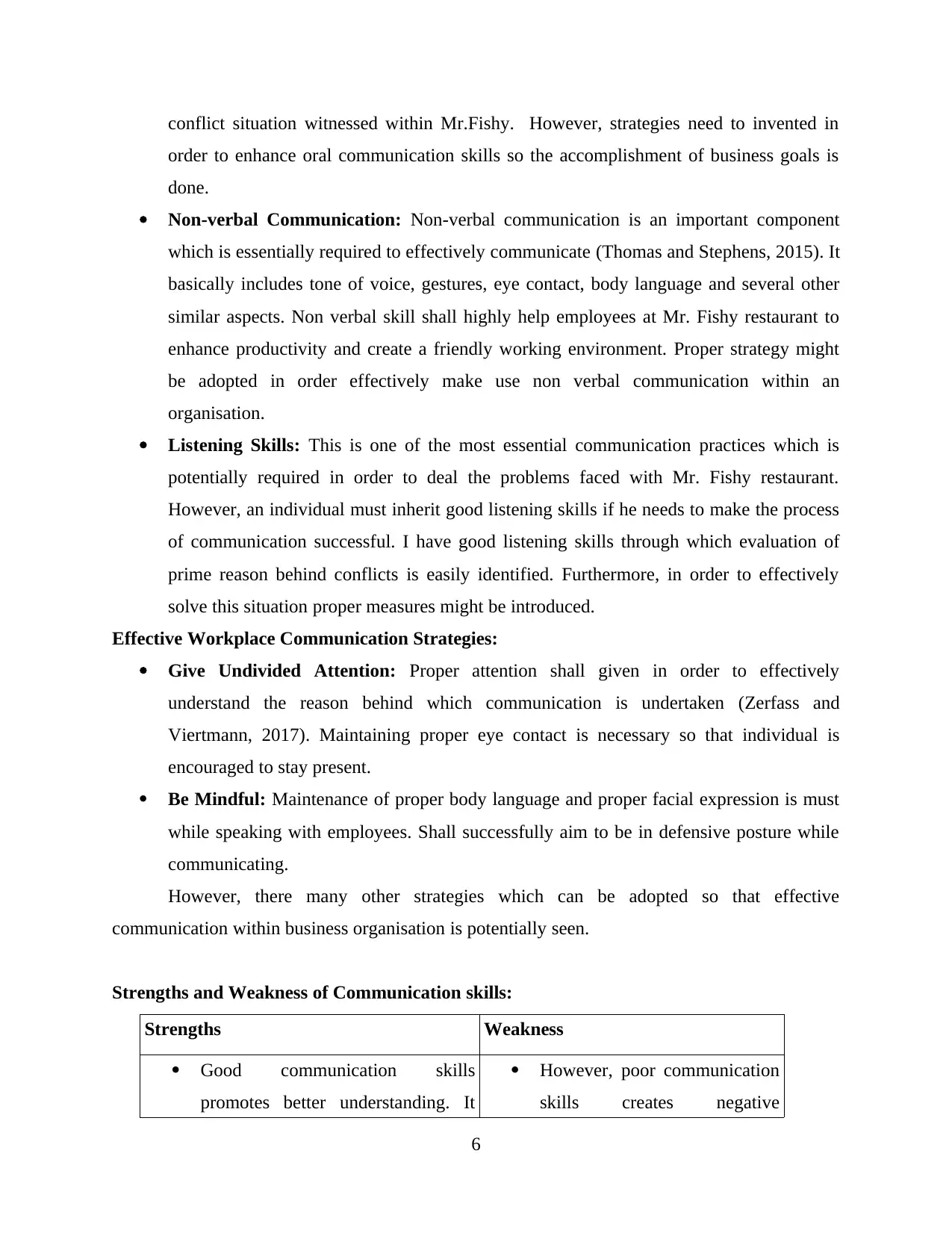
conflict situation witnessed within Mr.Fishy. However, strategies need to invented in
order to enhance oral communication skills so the accomplishment of business goals is
done.
Non-verbal Communication: Non-verbal communication is an important component
which is essentially required to effectively communicate (Thomas and Stephens, 2015). It
basically includes tone of voice, gestures, eye contact, body language and several other
similar aspects. Non verbal skill shall highly help employees at Mr. Fishy restaurant to
enhance productivity and create a friendly working environment. Proper strategy might
be adopted in order effectively make use non verbal communication within an
organisation.
Listening Skills: This is one of the most essential communication practices which is
potentially required in order to deal the problems faced with Mr. Fishy restaurant.
However, an individual must inherit good listening skills if he needs to make the process
of communication successful. I have good listening skills through which evaluation of
prime reason behind conflicts is easily identified. Furthermore, in order to effectively
solve this situation proper measures might be introduced.
Effective Workplace Communication Strategies:
Give Undivided Attention: Proper attention shall given in order to effectively
understand the reason behind which communication is undertaken (Zerfass and
Viertmann, 2017). Maintaining proper eye contact is necessary so that individual is
encouraged to stay present.
Be Mindful: Maintenance of proper body language and proper facial expression is must
while speaking with employees. Shall successfully aim to be in defensive posture while
communicating.
However, there many other strategies which can be adopted so that effective
communication within business organisation is potentially seen.
Strengths and Weakness of Communication skills:
Strengths Weakness
Good communication skills
promotes better understanding. It
However, poor communication
skills creates negative
6
order to enhance oral communication skills so the accomplishment of business goals is
done.
Non-verbal Communication: Non-verbal communication is an important component
which is essentially required to effectively communicate (Thomas and Stephens, 2015). It
basically includes tone of voice, gestures, eye contact, body language and several other
similar aspects. Non verbal skill shall highly help employees at Mr. Fishy restaurant to
enhance productivity and create a friendly working environment. Proper strategy might
be adopted in order effectively make use non verbal communication within an
organisation.
Listening Skills: This is one of the most essential communication practices which is
potentially required in order to deal the problems faced with Mr. Fishy restaurant.
However, an individual must inherit good listening skills if he needs to make the process
of communication successful. I have good listening skills through which evaluation of
prime reason behind conflicts is easily identified. Furthermore, in order to effectively
solve this situation proper measures might be introduced.
Effective Workplace Communication Strategies:
Give Undivided Attention: Proper attention shall given in order to effectively
understand the reason behind which communication is undertaken (Zerfass and
Viertmann, 2017). Maintaining proper eye contact is necessary so that individual is
encouraged to stay present.
Be Mindful: Maintenance of proper body language and proper facial expression is must
while speaking with employees. Shall successfully aim to be in defensive posture while
communicating.
However, there many other strategies which can be adopted so that effective
communication within business organisation is potentially seen.
Strengths and Weakness of Communication skills:
Strengths Weakness
Good communication skills
promotes better understanding. It
However, poor communication
skills creates negative
6
Paraphrase This Document
Need a fresh take? Get an instant paraphrase of this document with our AI Paraphraser
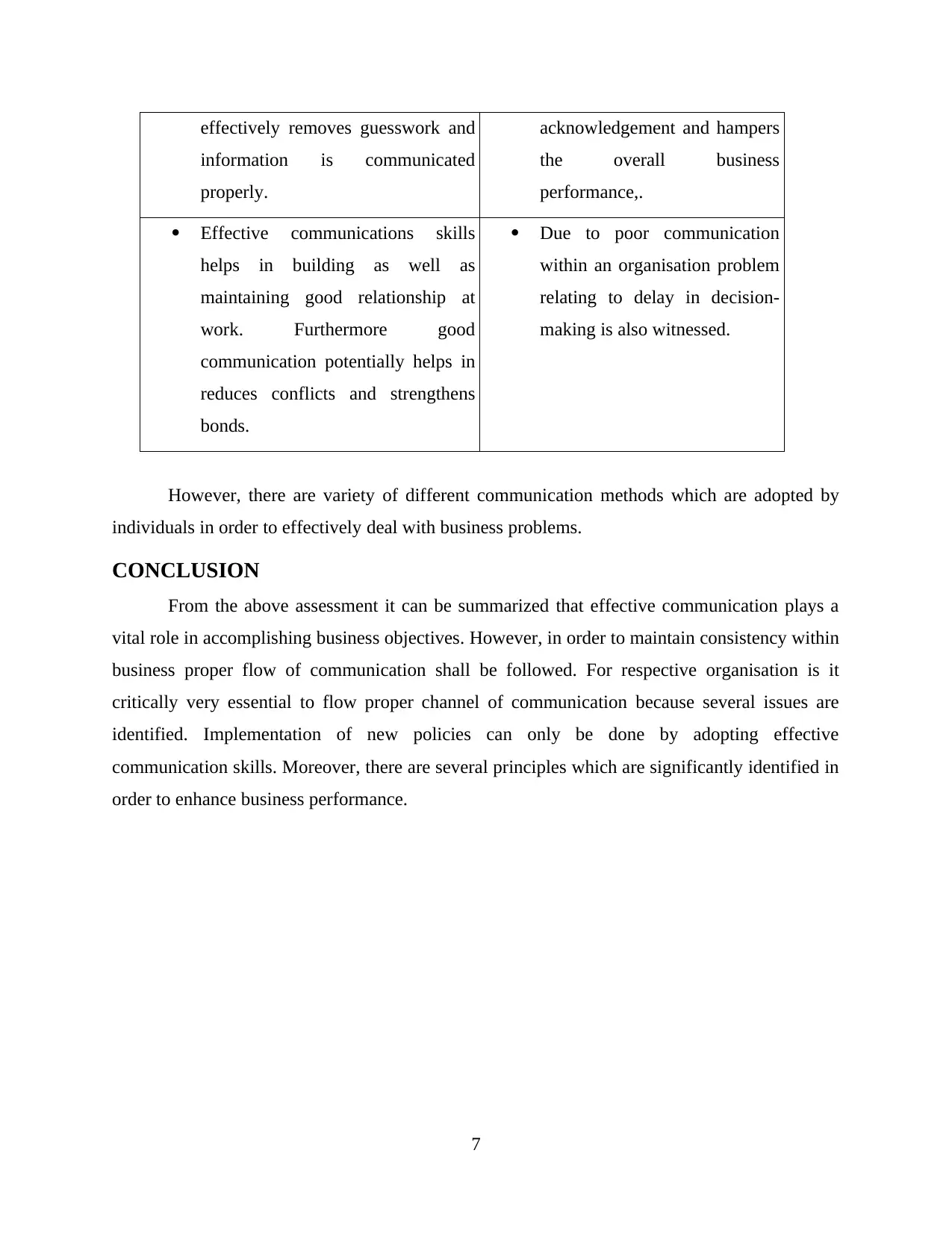
effectively removes guesswork and
information is communicated
properly.
acknowledgement and hampers
the overall business
performance,.
Effective communications skills
helps in building as well as
maintaining good relationship at
work. Furthermore good
communication potentially helps in
reduces conflicts and strengthens
bonds.
Due to poor communication
within an organisation problem
relating to delay in decision-
making is also witnessed.
However, there are variety of different communication methods which are adopted by
individuals in order to effectively deal with business problems.
CONCLUSION
From the above assessment it can be summarized that effective communication plays a
vital role in accomplishing business objectives. However, in order to maintain consistency within
business proper flow of communication shall be followed. For respective organisation is it
critically very essential to flow proper channel of communication because several issues are
identified. Implementation of new policies can only be done by adopting effective
communication skills. Moreover, there are several principles which are significantly identified in
order to enhance business performance.
7
information is communicated
properly.
acknowledgement and hampers
the overall business
performance,.
Effective communications skills
helps in building as well as
maintaining good relationship at
work. Furthermore good
communication potentially helps in
reduces conflicts and strengthens
bonds.
Due to poor communication
within an organisation problem
relating to delay in decision-
making is also witnessed.
However, there are variety of different communication methods which are adopted by
individuals in order to effectively deal with business problems.
CONCLUSION
From the above assessment it can be summarized that effective communication plays a
vital role in accomplishing business objectives. However, in order to maintain consistency within
business proper flow of communication shall be followed. For respective organisation is it
critically very essential to flow proper channel of communication because several issues are
identified. Implementation of new policies can only be done by adopting effective
communication skills. Moreover, there are several principles which are significantly identified in
order to enhance business performance.
7
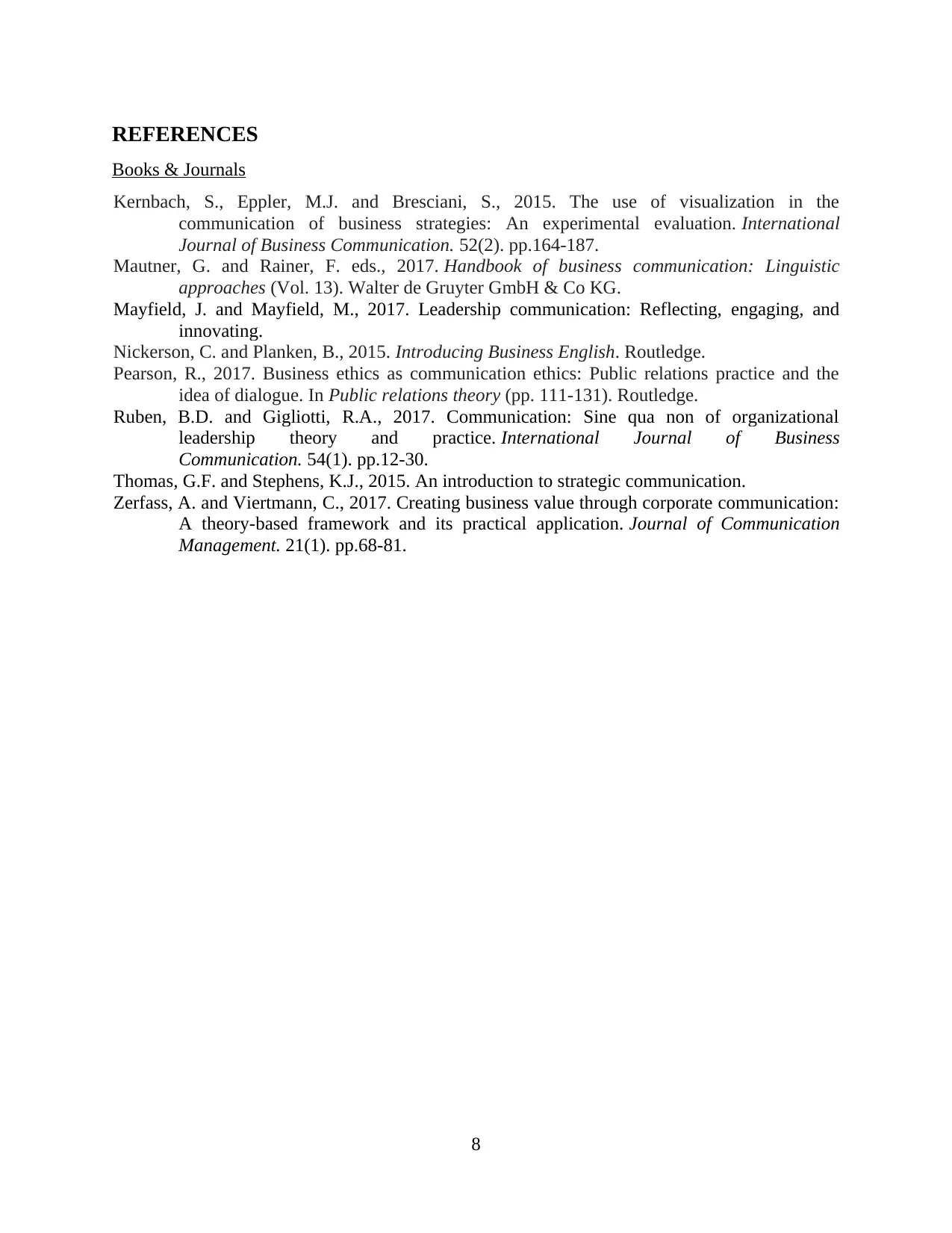
REFERENCES
Books & Journals
Kernbach, S., Eppler, M.J. and Bresciani, S., 2015. The use of visualization in the
communication of business strategies: An experimental evaluation. International
Journal of Business Communication. 52(2). pp.164-187.
Mautner, G. and Rainer, F. eds., 2017. Handbook of business communication: Linguistic
approaches (Vol. 13). Walter de Gruyter GmbH & Co KG.
Mayfield, J. and Mayfield, M., 2017. Leadership communication: Reflecting, engaging, and
innovating.
Nickerson, C. and Planken, B., 2015. Introducing Business English. Routledge.
Pearson, R., 2017. Business ethics as communication ethics: Public relations practice and the
idea of dialogue. In Public relations theory (pp. 111-131). Routledge.
Ruben, B.D. and Gigliotti, R.A., 2017. Communication: Sine qua non of organizational
leadership theory and practice. International Journal of Business
Communication. 54(1). pp.12-30.
Thomas, G.F. and Stephens, K.J., 2015. An introduction to strategic communication.
Zerfass, A. and Viertmann, C., 2017. Creating business value through corporate communication:
A theory-based framework and its practical application. Journal of Communication
Management. 21(1). pp.68-81.
8
Books & Journals
Kernbach, S., Eppler, M.J. and Bresciani, S., 2015. The use of visualization in the
communication of business strategies: An experimental evaluation. International
Journal of Business Communication. 52(2). pp.164-187.
Mautner, G. and Rainer, F. eds., 2017. Handbook of business communication: Linguistic
approaches (Vol. 13). Walter de Gruyter GmbH & Co KG.
Mayfield, J. and Mayfield, M., 2017. Leadership communication: Reflecting, engaging, and
innovating.
Nickerson, C. and Planken, B., 2015. Introducing Business English. Routledge.
Pearson, R., 2017. Business ethics as communication ethics: Public relations practice and the
idea of dialogue. In Public relations theory (pp. 111-131). Routledge.
Ruben, B.D. and Gigliotti, R.A., 2017. Communication: Sine qua non of organizational
leadership theory and practice. International Journal of Business
Communication. 54(1). pp.12-30.
Thomas, G.F. and Stephens, K.J., 2015. An introduction to strategic communication.
Zerfass, A. and Viertmann, C., 2017. Creating business value through corporate communication:
A theory-based framework and its practical application. Journal of Communication
Management. 21(1). pp.68-81.
8
⊘ This is a preview!⊘
Do you want full access?
Subscribe today to unlock all pages.

Trusted by 1+ million students worldwide
1 out of 9
Related Documents
Your All-in-One AI-Powered Toolkit for Academic Success.
+13062052269
info@desklib.com
Available 24*7 on WhatsApp / Email
![[object Object]](/_next/static/media/star-bottom.7253800d.svg)
Unlock your academic potential
Copyright © 2020–2026 A2Z Services. All Rights Reserved. Developed and managed by ZUCOL.





